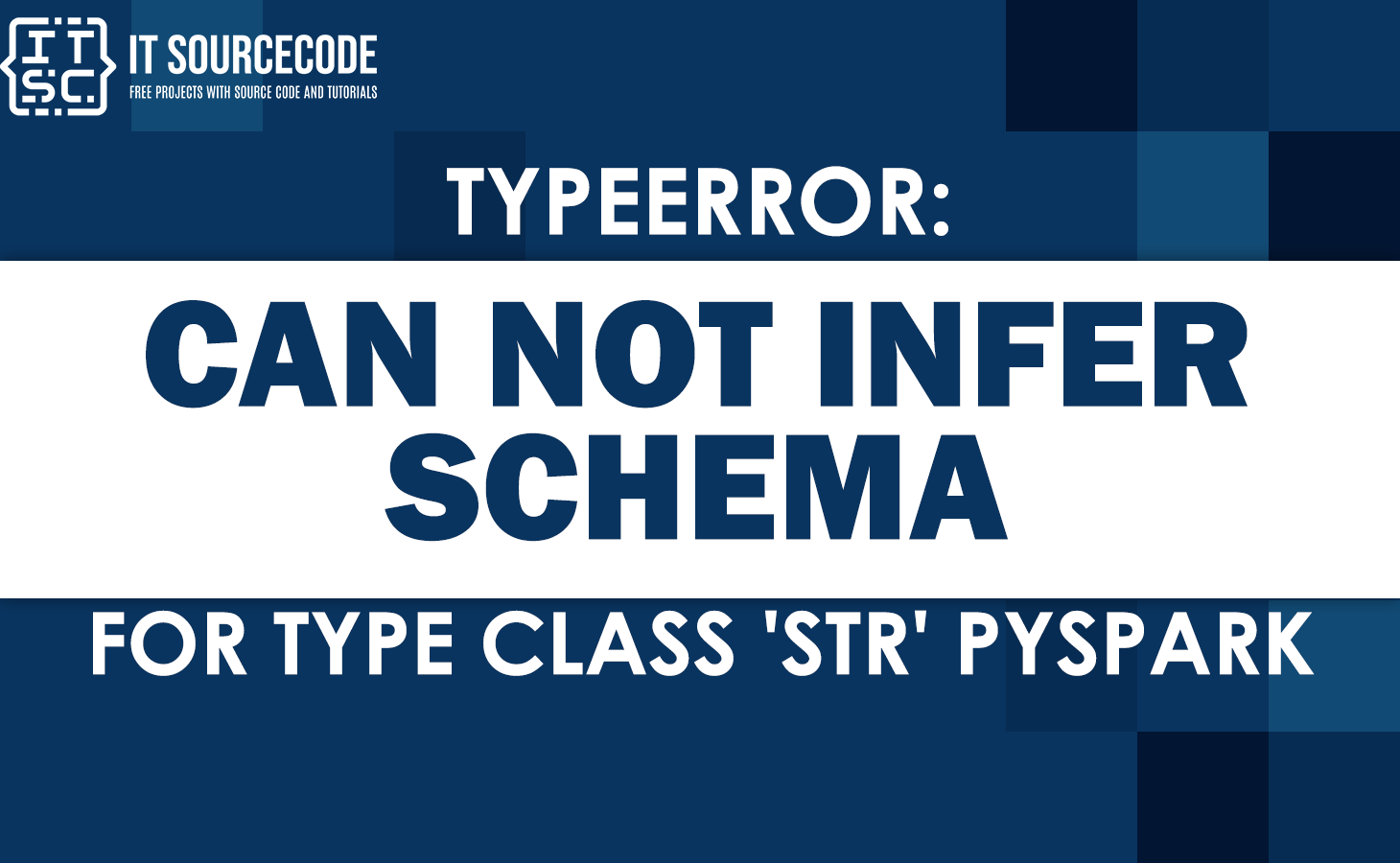Having trouble fixing “Typeerror can not infer schema for type class ‘str’ pyspark“? Worry no more, because you’re in the right place.
In this article, we will discuss the possible causes of this Typeerror, and provide solutions to resolve the error.
But before anything else, let’s first discuss what this Typeerror means.
What is Typeerror can not infer schema for type class ‘str’ pyspark means?
In PySpark, a common error that can occur when working with data frames is:
TypeError: Can not infer schema for type: class 'str'This error “can not infer schema for type class ‘str’ pyspark “ typically means that PySpark is unable to automatically infer the data type of one or more columns in a data frame.
This can happen when the data in a column is ambiguous or inconsistent, or when the data type is not supported by PySpark.
Let’s discuss further why this Typeerror Occurs.
Causes Of Typeerror can not infer schema for type class ‘str’ pyspark
TypeErrors in PySpark occur when there is a mismatch between the expected data type and the actual data type.
One common cause of this TypeError in PySpark is when the data contains invalid or unexpected characters that PySpark cannot parse as valid data types.
Here are some examples of how this error might occur:
- Incorrect data types in a schema definition:
from pyspark.sql.types import StructType, StructField, StringType, IntegerType
data = [("John", "Doe", "25"), ("Jane", "Doe", "30")]
schema = StructType([
StructField("first_name", StringType()),
StructField("last_name", StringType()),
StructField("age", IntegerType())
])
df = spark.createDataFrame(data, schema)In this example, the schema definition expects an IntegerType for the “age” field, but the data contains string values. This results in the:
TypeError: can not infer schema for type class 'str'- Invalid characters in data:
data = [("John", "Doe", "25"), ("Jane", "Doe", "30"), ("Invalid@Name", "Doe", "35")]
df = spark.createDataFrame(data)In this example, the “Invalid@Name” value in the first element of the third tuple contains an invalid character (“@“) that PySpark cannot parse as a valid data type. This results in the:
TypeError: can not infer schema for type class 'str'- Null values in data:
data = [("John", "Doe", "25"), ("Jane", "Doe", "30"), (None, "Doe", "35")]
df = spark.createDataFrame(data)In this example, the third tuple contains a null value for the “first_name” field. PySpark cannot infer the data type for this field, resulting in the:
TypeError: can not infer schema for type class 'str'Now let’s fix this error.
How to fix Typeerror can not infer schema for type class ‘str’ pyspark?
To resolve this Typeerror, ensure that the schema definition matches the data types in the data, and ensure that the data contains valid characters that PySpark can parse as valid data types.
If the data contains null values, you may need to specify a default value or handle null values separately.
To fix this error, you can try one or more of the following solutions:
- Use SparkContext.getOrCreate() instead of SparkContext():
from pyspark.context import SparkContext
from pyspark.sql.session import SparkSession
sc = SparkContext.getOrCreate()
spark = SparkSession(sc)- Use sqlContext.createDataFrame() than spark.createDataFrame():
df = sqlContext.createDataFrame(data, ["features"])- If the above does not work you can use SparkContext sc.createDataFrame():
df = sc.createDataFrame(data, ["features"])Here are the other solutions that you can use to fix this Typeerror:
Solution 1: Check your input data:
The error message suggests that PySpark is having trouble inferring the schema for your data, so it’s possible that there’s an issue with the data itself.
Make sure your input data is correctly formatted and that any string fields are actually strings (and not, for example, integers that have been converted to strings).
Solution 2: Define a schema explicitly:
If PySpark is having trouble inferring the schema automatically, you can define it explicitly using the StructType and StructField classes. This will give PySpark a clear blueprint for how to interpret your data.
Here’s an example:
from pyspark.sql.types import StructType, StructField, StringType, IntegerType
schema = StructType([
StructField("field1", StringType(), True),
StructField("field2", IntegerType(), True),
StructField("field3", StringType(), True),
])
df = spark.read.format("csv").schema(schema).load("path/to/your/file.csv")Solution 3: Use the inferSchema option:
When reading your data with spark.read, you can specify the inferSchema option to have PySpark attempt to infer the schema automatically.
For example:
df = spark.read.format("csv").option("inferSchema", "true").load("path/to/your/file.csv")Solution 4: Convert problematic fields:
If you have a specific field that’s causing trouble, you can try converting it to a different type that PySpark can more easily interpret.
For example, if you have a field that should be a date but is currently a string, you can use the to_date function to convert it:
from pyspark.sql.functions import to_date
df = df.withColumn("date_field", to_date("date_field", "yyyy-MM-dd"))Conclusion
In conclusion, this article “Typeerror can not infer schema for type class ‘str’ pyspark” is an error message that occurs when the PySpark engine is having difficulty inferring the data type for a string column in your data.
By following the given solution, surely you can fix the error quickly and proceed to your coding project again.
If you have any questions or suggestions, please leave a comment below. For more attributeerror tutorials in Python, visit our website.

